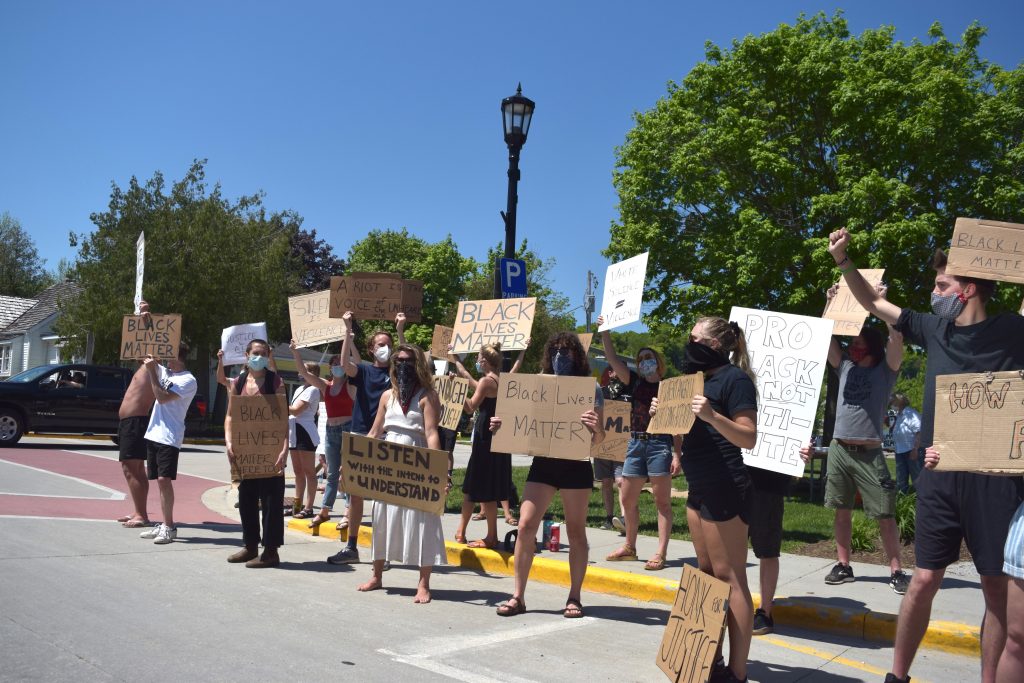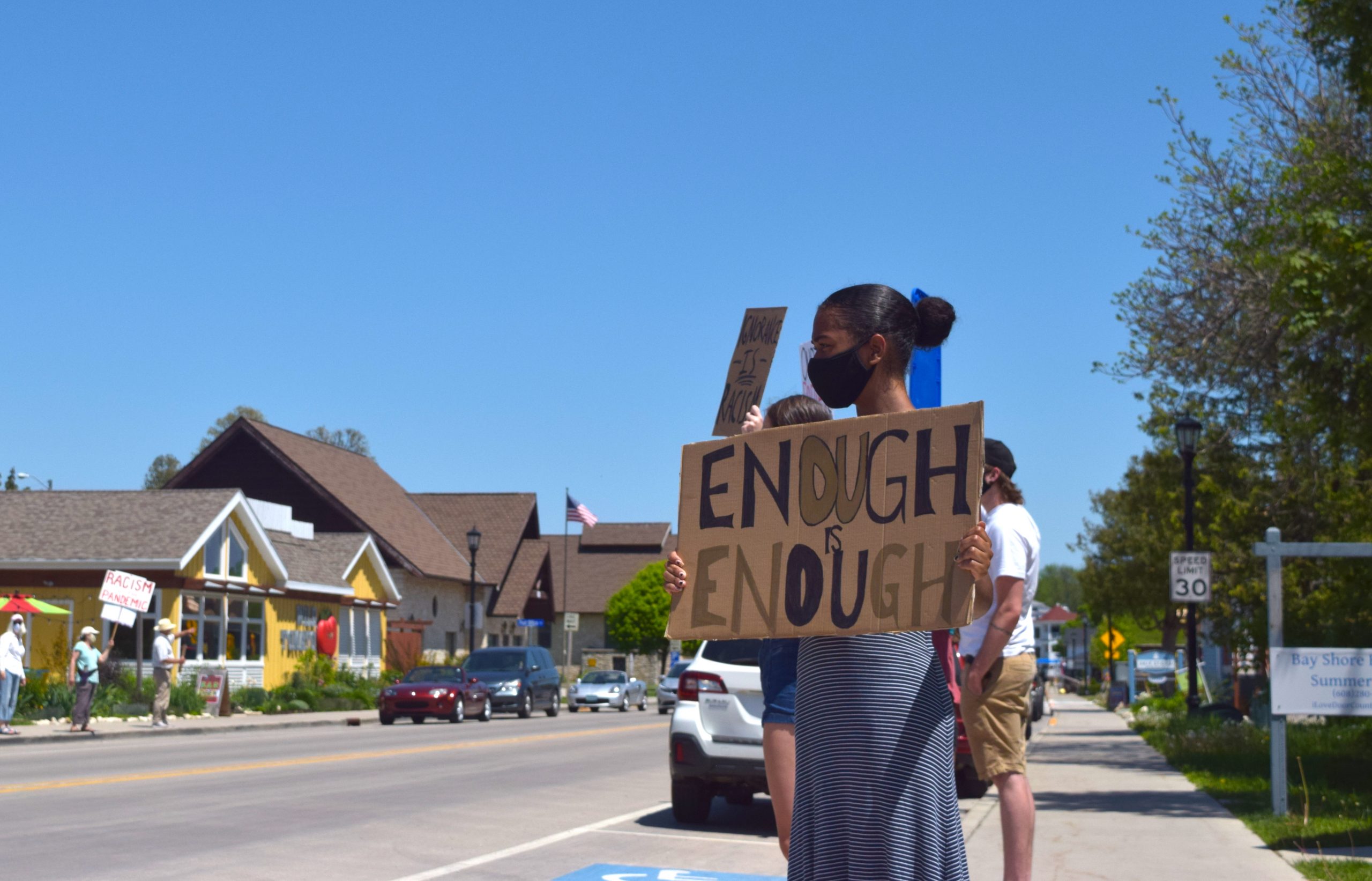Amid concerns among local activists and residents about police use of force and racism in Door County, law enforcement leaders this week said they are open to having conversations with community leaders about policing.
“I think these conversations – they’re important, and they need to happen, and people need to work together for the good of everybody,” Sheriff Tammy Sternard said. “I think the key component is the ‘we.’”
Sternard said she envisions the community coming together to have discussions about law enforcement in the county, what can be improved, and how any changes can be executed. She said there isn’t a single entity that will make the concerns expressed by protesters go away.
The agenda for a county public safety committee meeting Monday includes a presentation of the Door County Sheriff’s Office’s annual use of force report for 2019; discussion of an offer from a local military support group to pay for helmets and shields for the office; and a proposal to buy and implement body cameras for officers in 2021.
The use of force report shows seven incidents of use of force last year in the Sheriff’s Office patrol division and three incidents in the jail division. All of the incidents were captured on video, according to the report.
The incidents included one Taser deployment, one Taser display and two weapon displays in the patrol division, and one use of a restraint chair in the jail division.
Donor offers to pay for helmets, shields
Adopt a Soldier Door County, a Sturgeon Bay-based nonprofit organization, has offered to donate $10,000 to the Sheriff’s Office to pay for the helmets and shields that the office requested and that the county finance committee voted down last month. The donation is subject to approval by the public safety committee.
“As you know, our mission is to serve our local veterans,” the group’s organizer, Nancy Hutchinson, wrote in a letter to Sternard regarding the donation. “We know that some of the department’s deputies are veterans and because they continue to serve and protect our community, we would like to help protect them with the equipment that protects everyone.”
Sternard said her request for helmets and shields costing $9,996 for officers came as a result of assistance requests the Sheriff’s Office received from other law enforcement agencies amid protests around the state.
The assistance requests came both from nearby agencies and from Milwaukee and Madison through Wisconsin’s Emergency Police Services system of mutual aid between law enforcement agencies, Sternard said.
Anya Kopischke, one of the organizers of the Black Lives Matter Solidarity of Door County group, started a petition against the proposal that received over 500 signatures. (Disclosure: Kopischke is the child of Knock board member Alan Kopischke.)
“It is an especially egregious and unnecessarily antagonistic action, as it coincides with the largest civil rights movement the world has seen to date,” they wrote in the petition. “This military grade weaponry only serves to escalate situations, while targeting U.S. citizens.”
“I think these conversations – they’re important, and they need to happen, and people need to work together for the good of everybody.”
Door County Sheriff Tammy Sternard
Sternard said she felt an ethical obligation to help other agencies because the Sheriff’s Office might need those agencies’ help in the future. The Sheriff’s Office is under no legal obligation to provide assistance to other agencies, Sternard said, but she likened the mutual aid system to neighboring emergency management or fire departments helping each other.
Sternard said she did not feel comfortable sending officers to assist other agencies without the helmets and shields. When asked whether she could foresee the gear being used in Door County, Sternard said she has considered the possibility.
Sternard said she felt comfortable attending the Black Lives Matter protest in Sturgeon Bay last month.
“That being said, communities similar in size have dealt with things beyond their scope,” Sternard said. “Again, just the lack of being prepared is not acceptable to me.”
Kopischke questioned whether military-grade gear was actually helping in attempts to de-escalate situations.
“I want to see a situation where military-grade gear has actually protected everyone on both sides,” they said.
Sternard said the equipment is intended to protect officers, whether they are assisting other agencies or on duty in Door County.
“I stand by my request,” Sternard said. “I do feel that if we are going to expect the men and women to respond to those situations, we have an obligation to protect them and to be prepared. Do I hope it never has to come out of their car? Absolutely. But it would be irresponsible for me as a sheriff to not bring it forward.”
“We prepare for all kinds of situations,” she added. “That’s part of our world. And I think that’s honestly what people expect from us.”
Body cameras proposed for 2021
Chief Deputy Patrick McCarty said the Sheriff’s Office’s decision to move forward with a body cameras proposal was related to the national conversation about policing this year.
“Given our national climate right now, the sheriff wants to explore that,” McCarty said. “It’s ultimately going to become a budgetary decision that the county board and the county administrator have to make.”
The Sheriff’s Office has discussed the potential for using body cameras over the years, McCarty said, but has held back in part because of the cost involved in storing the video and redacting it when a public records request for it is made. Video can be redacted if it shows the inside of a private residence or if a minor is involved, he said.
The body camera package the Sheriff’s Office selected uses cloud-based storage for the video and has a user-friendly redaction system, McCarty said, which reduces the cost involved in storing it and the labor required to redact it.
Body cameras offer better documentation than the dash cameras the Sheriff’s Office already uses, McCarty said. On what McCarty termed “high-risk” calls, he said officers are likely to park their cars farther away from an incident, rendering the dash cameras less useful. The microphones that officers wear, which are connected to the dash cameras, lose signal if they get farther than 50 yards from the car, McCarty said.
McCarty said the body camera package the office selected also will integrate with its existing records systems, making it easy to tie all related records together.

Agencies move toward more formal use of force policies
Law enforcement agencies throughout the county have moved toward more formal policies governing the use of force in recent years.
The Sheriff’s Office has adopted use of force and other policies from Lexipol, a California-based company that provides policies, training bulletins and other services to law enforcement agencies.
Sternard said the Lexipol policies are based on best practices and case law and can be updated regularly and easily. Officers long have been required to report use of force incidents, Sternard said, but the new use of force policy formalized the reporting to include the annual use of force report.
McCarty said the Lexipol system also requires officers to acknowledge that they have received and read policies and policy changes.
Today, McCarty said, officers are required to notify their supervisor and fill out a four-page report for any incident involving the use of force that goes beyond handcuffing someone. Officers also have to submit video of the incident, if it is available, he said.
The report then is reviewed by a use of force instructor – who determines whether it fell within policy and the officer’s training – and a member of the Sheriff’s Office’s command staff (its top four members), McCarty said.
McCarty said the office has not had an improper use of force incident in his time as chief deputy.
“If that would occur, first we’d look at is that a training issue?” he said. “Is that something we’d have to look at throughout the department?”
If a use of force incident violates policy, McCarty said, the office has a discipline process that can result in a penalty for the officer. Penalties can range from a warning to termination, he said.
McCarty said use of force by the Sheriff’s Office is minimal. He attributed that in part to the wide geographic area each officer covers.
“Our deputies have very large sectors that they’re responsible for, with minimal backup,” McCarty said. “They’re very good communicators.”
The towns of Gibraltar and Washington each have their own, small police department. The town of Gibraltar also uses a use of force policy from Lexipol, and the town of Washington uses the Sheriff’s Office’s use of force policy.
The Sturgeon Bay Police Department last month updated its use of force policy to include a requirement for reporting use of force incidents. The department’s policy does not come from Lexipol. The previous version of the policy, which went into effect in 2016, did not mention reporting use of force incidents.
Attempts to reach leaders of the Sturgeon Bay Police Department for comment were unsuccessful.
Local Black Lives Matter Solidarity group calls for defunding police
While Sternard has proposed discussion on the topics of policing and racism, she said she does not see “a knee-jerk reaction” on defunding or implementing anything as a good way to move forward.
Kopischke said discussion is part of the solution, but they would like to see additional measures taken.
“I think there have been a lot of false claims for change and displays of solidarity that are often the benefit of insightful and thoughtful conversation,” Kopischke said, “but that doesn’t get us justice.”
They said that changing the color of bandages to match all skin tones, painting the words “Black Lives Matter” on streets, and tearing down monuments are great steps forward and have come from conversation, but they haven’t gone all the way to ensuring public safety.
“I think that the Door County Sheriff’s Office could do a better job at standing in solidarity with the recent requests in the protests that are happening nationwide,” Kopischke said. “The further spending and the militarization of the Sheriff’s department—even if it is low-grade like the body shields and helmets—is sending a very strong message particularly to the people of color in this community, and all of the supporters of the Black Lives Matter movement that there is an animosity between the citizens and the department.”
Kopischke said concerns about perceived militarization were echoed by other Black Lives Matter Solidarity group members, but the group is more focused on educating, creating awareness, and attempting to activate the passion of the community. Kopischke said the calls for equity and safety for Black communities across the country have stemmed from police brutality.
“Our fight will not be over until our Black and Brown communities will be safe from police brutality,” they said. “That can’t happen until we have our local and federal governments making clear promises that policing will be diminished in some way.”
The group’s stance on defunding the police also has come from its solidarity with the nationwide Black Lives Matter movement.
“We are trying to position ourselves to be useful and productive to that movement in whatever way we can,” Kopischke said, “and right now they are calling for defunding and abolition of the police, which obviously affects urban areas more than it affects our small town, but in order to support that movement, we need to find a way to support those calls.”
Backlash comes from visitors
Protesters have been met with some harassment and potential threats. In addition to the threatening video posted on Twitter on July 4 that is being investigated by the Sheriff’s Office, protesters have reported being cursed at and otherwise verbally harassed.
Kopischke filed a report to JUST Door County, a nonprofit that collects incident reports that involve harassment or discrimination, about a conflict they had June 19 in Baileys Harbor during a Juneteenth protest with a visitor to the county who confronted them about protesting and their sexual and gender orientation.
They said the man, who claimed to be an ex-cop, threatened to follow Kopischke and their family home and protest on their property with a sign that said “Blacks suck.”
“It just really showed me how far people are from having an understanding with each other,” Kopischke said. “It also showed me how much we weaponize our words against each other just to make each other feel scared, stupid, or helpless because we don’t agree. I wanted to have a productive conversation, but instead, it just depleted me.”
“While I know that some people are uncomfortable with our protest, I think it is important that we are there.”
Anya Kopischke, one of the organizers of the Black Lives Matter Solidarity of Door County group
The harassment has not prevented Kopischke and other protesters from continuing with daily demonstrations.
“While I know that some people are uncomfortable with our protest, I think it is important that we are there,” they said.
Sternard emphasized that the Sheriff’s Office wants to be a resource to the community and encouraged people to contact her if they have concerns about something an officer has done or not done. She said she can’t guarantee that an incident of police misconduct or racism won’t happen in Door County but said she feels good about the office’s practices.
“I can’t say to anybody that it’ll never happen here,” Sternard said. “I hope it doesn’t. I feel that we have good policy, we spend an appropriate amount of time training people. We’re small enough that we have relationships from the top of the organization down to the newest deputy.”

